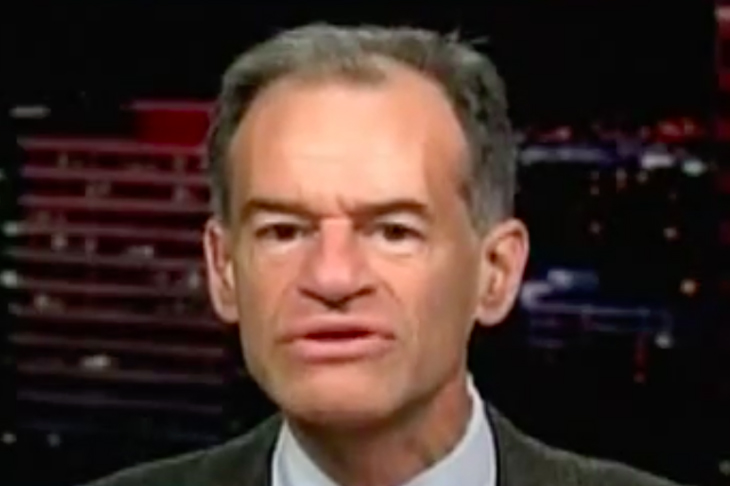Ron Unz is a curious man, both in the sense of being curious about things and in the sense of inspiring curiosity. Born in California into a Jewish family, Unz studied at Cambridge and Stanford before making millions through a financial-software firm. Some of us would have retired at that point to enjoy life with no more arduous pursuits than the occasional swim but not Unz. He began to involve himself with politics.
In the 1990s, Unz was best known for the humble cause of promoting California Proposition 227, which attempted to promote monolingual education in Californian schools to advance immigrant assimilation. A somewhat bewildered CNN profile made note of his resourcefulness, intelligence and ambition — or, as they characterised it, his hubris.
Unz was also building a reputation as a writer. His articles, for newspapers and magazines like the Wall Street Journal and the Weekly Standard, largely focused on education but his most significant and controversial essay, for the neoconservative journal Commentary, put Proposition 227 into the context of ‘California and the End of White America’. Unz approved of the demographic transformation of the state and the US but emphasised the need to promote assimilation or else face native discontent. ‘There are few forces that could so easily break America as the coming of white nationalism,’ his essay concluded.
Given these ambitious progressive sentiments it was surprising when, in March 2007, he became the publisher of the The American Conservative. Founded by three paleoconservatives, Pat Buchanan, Scott McConnell and Taki Theodoracopulos, the magazine had become an influential voice of opposition to US wars and mass immigration. Unz has written that he found the latter theme obnoxious but that he valued the magazine’s anti-interventionism. He invested much of his fortune in the magazine, and, in time, began to use it as an outlet for his writings.
Unz wrote some of the magazine’s most successful essays. A piece arguing that Hispanics did not have high crime rates was applauded in the liberal press. An analysis of bias against Asian-Americans in Harvard’s admissions system was widely discussed and encouraged the creation of the Free Harvard, Fair Harvard campaign on which he worked with veteran leftist Ralph Nader.
Unz left The American Conservative in 2013. He argues he was forced out for submitting contentious material while the editor claimed that he was arrogant and overbearing. Unz created his own sites, which included archives of old books and essays and The Unz Review, an online journal of opinion.
The Unz Review wasn’t bad in its first years. It was edgier than The American Conservative. There was much to disagree with. But it also contained much of interest. Unz had begun to finance and publish nationalists, which he rationalised by saying that he did not agree with them but thought that they deserved a space in the public sphere. He also published acres of anti-Israel content, which became more tedious than anything.
Unz’s own writings became more combative. He had begun a series called ‘American Pravda’, which exposed forgotten history and assessed conventional wisdom. Some pieces were edifying. Others were hard to swallow. An interesting article on the almost entirely forgotten ‘Zebra Killers’ — Black Muslim murderers who targeted white people — spiralled off into insinuations about Emmett Till possibly assaulting Carolyn Bryant, insinuations based largely on the fact that his father, who his mother had kicked out when young Emmett was an infant, — had been a rapist. To smear Till without evidence seemed obnoxious.
The suspicion that Unz’s contrarian instincts were growing out of control was exacerbated when he published an article by the radical Muslim conspiracy theorist and fantasiser about the deaths of journalists Kevin Barrett which somehow worked Holocaust denial into an analysis of a theology book. It was nasty rubbish.
In June, Unz published an essay saluting the ‘remarkable’ historiography of David Irving. In his legal fight against the historian Deborah Lipstadt, Unz wrote, Irving’s work was analysed ‘line-by-line, footnote-by-footnote’ by historians who ‘came up empty’. Readers of expert witness Richard J. Evans’s report on Irving’s scholarship will know this to be false. Unz followed this essay with an approving appraisal of the Nazis’ treatment of France that never once mentioned their millions of murders in Central and Eastern Europe, long articles implicating Mossad in the killings of John and Robert Kennedy and a series of analyses of Jewish history which concluded that Judaism entails ‘the enslavement or execution of all non-Jews’, that the Protocols of the Elders of Zion is ‘a classic of political thought’, that the Holocaust almost certainly did not take place in a recognisable form and that anti-Semitism has in general been well-founded.
To even critique such arguments as one might essays on economics and constitutional law might be considered ill-advised if not offensive. Still, empirical arguments demand empirical responses, because, if nothing else, it might be thought that silence in the face of a claim is an admission of defeat. A comprehensive response to Unz’s voluminous arguments would fill a book if not a series of them. There are at least three defective features of his ramblings, though, which are characteristic of excessively conspiratorial thought:
- Take an interesting fact, strip it from its context and frame it in the way that is worst for one’s targets — in this case, by and large, the Jews. As his primary evidence that Judaism is based on murderous hatred for gentiles, for example, he mentions the late Sephardic rabbi Ovadia Yosef claiming ‘the Goyim were born only to serve us’, an interesting and unpleasant fact! But what Unz does not mention is that the Anti-Defamation League, the American Jewish Committee and members of the Israeli government up to and including the Prime Minister criticised Yosef’s extremism.
- Cite a source without properly representing its contents. Unz claims, for example, that Winston Churchill’s 1920 article on ‘Jewish Bolsheviks’ was ‘nearly as hostile and nasty towards Jews’ as Hitler would be in Mein Kampf. This puts so much strain on the word ‘nearly’ that it collapses upon inspection. Churchill was nothing like as combative and vitriolic as his future adversary.
- Cite a controversial source without question. Unz bases the extraordinary claim that ‘religious Jews apparently pray to Satan almost as readily as they pray to God’, for example, solely on the word of a professor of organic chemistry. Unz suggests that a work of Holocaust denial ‘persuasively demonstrates’ that far fewer Jews were killed than has been thought and encourages readers to ‘take a look and decide for themselves’, but does not mention its numerous, detailed rebuttals.
There is no denying that Unz bases his arguments on interesting information. It is interesting, for example, that the wealthy Jewish banker Jacob Schiff strongly supported Russian revolutionaries in Tsarist Russia. Appalled by the violent anti-Semitism under the Tsar’s rule he recklessly fomented revolution. This is a sobering fact but leads Unz to jump to the grand conclusion that ‘the notion that the international Jewish bankers created the worldwide communist movement…appears to be more or less true.’ He ignores the evidence in Anthony C. Sutton’s Wall Street and the Russian Revolution that many Jewish and non-Jewish bankers and politicians were integral to the success of Bolshevism. He ignores the evidence in Sutton’s book and Priscilla Roberts’ paper ‘Jewish Bankers, Russia and the Soviet Union’ that while Schiff admired Kerenksy, he not only intellectually but materially opposed the Bolsheviks. The relationship between Jews and communism is an interesting one, but leaving no room for nuance in one’s discussion of it is in keeping with that of a different but no less infamous propaganda rag to Pravda.
The path that Unz has taken is not unique to him. His work draws heavily on the historical revisionists who worked for different outlets and offshoots of Willis Carto’s fringe populist organisation the Liberty Lobby, including The Spotlight, American Free Pressand the Institute for Historical Review. Unz’s colleague Philip Geraldi and Unz Review contributor Paul Craig Roberts have both been published by American Free Press. At their worst the people in these spheres hated as naturally as they drank and slept. At their best their loathing of the wars of America and its allies led them to a strange, impulsive sympathy for whoever they happened to be fighting.
It seems that Unz is fairly new to these subjects. Throughout his essays, he describes his ‘shock’ on finding that ideas he had ‘always dismissed without consideration, were probably correct.’ He had ‘naively believed what [he] had read in [his] textbooks’ but now experienced ‘tremendous humiliation for having spent most of my life being so totally wrong about so many things.’
Unz’s earlier writings betray few signs of being the work of someone who might harbour the beliefs that he now holds. True, he wrote in 2001 that ‘the long confrontation between the Israelis and the Palestinians’ was a ‘contributing factor’ to 9/11 but when he referred in the same piece to ‘Jewish religious lunatics’ it was to undeniable nutbags like the vicious terrorist Baruch Goldstein. The Iraq War understandably outraged him, and his sentiments became more radical. He suggested, for example, that the neoconservative writer Lawrence Kaplan was ‘somewhat nervous that he and his fellows may soon face trial and execution for their promotion of this war.’ I am unaware of this possibility occurring to anyone else outside the most fevered fringes of the blogosphere.
Unz did not tend to write on Israel or US foreign policy for The American Conservative but he did fund anti-Zionist websites and researchers such as Mondoweiss and Norman Finkelstein. Still, I suspect the roots of his current opinions lie not in Jewish anti-Semitism but a kind of runaway contrarianism.
Contrarianism begins, by and large, with the valid conclusion that many of the ‘facts’ that we are told — by politicians, or the media, or academic and religious institutions — are less than wholly true. You begin to question other aspects of conventional wisdom. There is nothing wrong in this. Yet your questions, and methods of answering them, have to be rational. Otherwise your iconoclastic instincts are unmoored from reason; your passions and biases take over in the flattering guise of independent thought. You question established narratives but swallow alternative claims. You leap to alternative ideas but avoid questioning yourself. In the most extreme cases, you begin by questioning the grounds for preemptive wars and ends by claiming that religious Jews routinely worship Satan.
That, sadly, appears to be what has happened to Ron Unz.

























